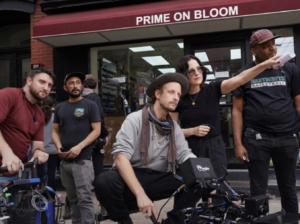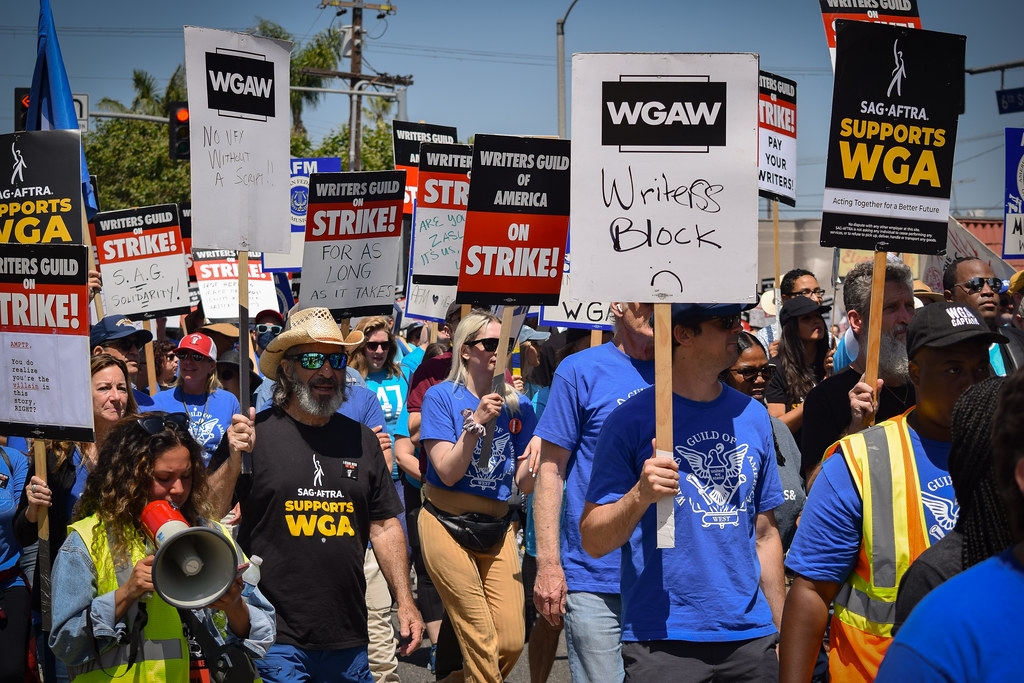NJ Governor Phil Murphy has been vocal in expressing his desires to turn New Jersey into the premier filmmaking destination on the East Coast. In 2022, the overall in-state production spending from filmmaking surpassed $650 million dollars, an increase of $150 million from the previous year. The expansion of television, motion picture and streaming productions created more than 8,500 jobs in the state in 2022. As many other studios were expected to finish construction in the Garden State, this number was expected to grow even more, but that is when they hit a roadblock.
After weeks of failed negotiations, the members of the Writers Guild of America (WGA) and Screen Actors Guild – American Federation of Television and Radio Artists (SAG-AFTRA) went on strike in hopes of finding an agreement that would guarantee better pay and job security in this new, AI-filled world.
The strikes effectively halted production of any motion pictures or television shows, with the exception of smaller, indie projects. This meant that New Jersey’s booming film industry would lose its momentum and hope to gain traction once the production of movies eventually started again. Now, the end is finally within reach, as the WGA has reached a tentative agreement with the Alliance of Motion Picture and Television Producers (AMPTP). The WGA strike officially ended on Wednesday, Sept. 27, signifying the beginning of the process to reopen films and television shows that were in production.
It is important to remember that the strikes are still taking place, since SAG-AFTRA has not been able to reach an agreement yet, but the agreement reached by the WGA shows that we can expect production to slowly return somewhere in the near future, most likely in 2024. Talk shows and late night are expected to be among the first productions to resume, while scripted series’ are expected to take longer to resume due to the SAG-AFTRA strike continuing.
Even though filming for most productions won’t start up for at least a few months, New Jersey is continuing to expand its presence in the film industry, with the announcement of a new movie studio on an Atlantic City Pier. ACX1 Studios has found a new home in a four-story, 550,000 square-foot building that was previously the Playground Pier. “We want to basically make Atlantic City into the new Hollywood,” said Dom Franklin, chief operating officer at ACX1 Studios. ACX1, which stands for Atlantic City Experiences, will look to turn the pier’s vacant stores, restaurants and bars into production sets.
 Film productions are not just limited to South Jersey, as multiple locations across North Jersey served as set pieces for Nicol Paone’s film, The Kill Room, which was released on Sept. 29. The movie is composed of several Hollywood stars including Samuel L. Jackson, Uma Thurman and her daughter, Maya Hawke. In May, before the strikes began Jackson and Thurman were spotted in Hoboken and Jersey City filming scenes for the movie. Production also took place near Angelo’s Ristorante in Paone’s hometown of Lyndhurst, according to a social media post from the director.
Film productions are not just limited to South Jersey, as multiple locations across North Jersey served as set pieces for Nicol Paone’s film, The Kill Room, which was released on Sept. 29. The movie is composed of several Hollywood stars including Samuel L. Jackson, Uma Thurman and her daughter, Maya Hawke. In May, before the strikes began Jackson and Thurman were spotted in Hoboken and Jersey City filming scenes for the movie. Production also took place near Angelo’s Ristorante in Paone’s hometown of Lyndhurst, according to a social media post from the director.
The return of film production will not only benefit the studios in New Jersey but also the small mom and pop shops located around the studios that were able to find business by catering the cast and crew on set or lending their store for filming. Unlike major studios, some of these shops haven’t been able to recover as easily, so it is motivating to see writers and actors beginning to work again.
During the strike, interim agreements were reached for two projects, those being Steven Soderbergh’s Presence and Kevin Smith’s The 4:30 Movie. Since there are already movies lined up to be produced in the Garden State, it is safe to say that they will pick up where they left off once the SAG-AFTRA strike is over.
According to the latest annual report from the New Jersey Motion Picture & Television Commission, a total of 619 projects were made in New Jersey in 2022, generating $701.9 million for the state’s economy. The funding of more projects leads to more employment in the state, as 14,620 jobs were created last year from projects that received financial incentives.
A significant number of the film studios appearing in New Jersey stem from NJ Governor Phil Murphy’s revival of the Garden State Film and Digital Media Jobs Act. The bill, which was passed in 2018, gave up to $75 million in tax credits for film production and up to $10 million for digital media over the span of five years. In 2005, New Jersey began to offer tax credits for film and television production at a substantially lower amount. However, in 2010, former Governor Chris Christie suspended the program, claiming that it was not affordable. At the time, it was feared that the state could lose up to $425 million from this program, but the possible gains of this program were much greater than that. Now, with a new film studio beginning construction in New Jersey every month, the benefits of this project are clear to see.
When looking at the NJ Motion Picture & Television Commission’s annual report, the positive impacts of the tax credits become even more obvious. In 2017, the State of New Jersey was earning about $121 million through film production. A year later, that number ballooned to $421 million and continued to grow each year, with the exception of 2020 due to COVID. The earnings for last year sit at around $700 million and will likely continue to grow.














